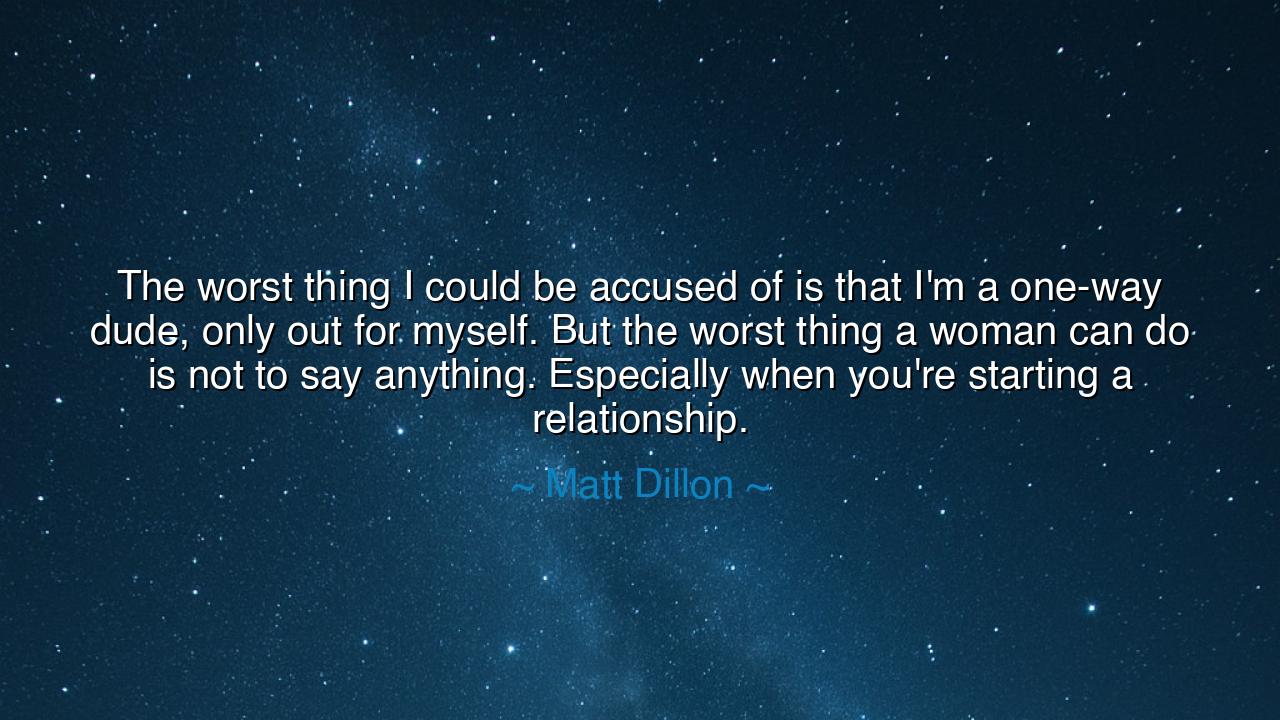
The worst thing I could be accused of is that I'm a one-way
The worst thing I could be accused of is that I'm a one-way dude, only out for myself. But the worst thing a woman can do is not to say anything. Especially when you're starting a relationship.






Hear the words of Matt Dillon, who spoke with honesty about the perils of silence and selfishness: “The worst thing I could be accused of is that I’m a one-way dude, only out for myself. But the worst thing a woman can do is not to say anything. Especially when you’re starting a relationship.” In this confession lies the wisdom that love requires both giving and speaking, for without them no bond can endure.
He names first the danger of being a one-way soul—selfish, closed, seeking only one’s own gain. Such a path leads to isolation, for love cannot grow where only one heart is nourished. To be accused of this is to be accused of betraying the very essence of union, which is built upon reciprocity and shared devotion.
Yet he also warns of the opposite danger: the refusal to speak. In the beginning of a relationship, silence may seem safe, but it becomes a poison that slowly erodes trust. Words unspoken harden into walls, and what could have been healed by openness festers in darkness. Thus, Dillon declares that to withhold one’s voice is as destructive as selfishness, for it denies the possibility of true connection.
His teaching reveals the dual pillars of love: selflessness and communication. To give without demand, and to speak without fear—these are the roots of trust. Without them, the bond is fragile, destined to crumble under the weight of misunderstanding or neglect.
Therefore, O seekers, remember: in the sacred beginning of every relationship, guard yourself against the chains of selfishness, and never hide in the silence of fear. Speak, share, and give, for in these acts lies the seed of enduring love. In Dillon’s words we hear the wisdom of the ancients—that the heart must be both generous and honest, lest the bond be no bond at all. Would you like me to cast this into a parable of two lovers—one who spoke and one who stayed silent—so the lesson shines more brightly?






NVkim ngan vu
Matt Dillon’s comment brings an interesting view on communication in relationships. However, I wonder if it oversimplifies the situation by placing so much emphasis on speaking out. Isn’t it also about listening and understanding each other’s needs and boundaries? Maybe the real challenge lies in how both people approach vulnerability and communication, rather than putting the onus solely on one person to voice their feelings from the outset.
DVDuong Vy
I find Dillon’s perspective intriguing, but I’m curious about the idea of ‘saying something.’ Does that mean always being direct and upfront, or does it allow for nuance and understanding? When starting a relationship, sometimes silence or hesitation can be a sign of uncertainty or fear, rather than a lack of effort. Shouldn’t both partners be patient with each other’s pace in opening up?
MTCao Minh Trang
Matt Dillon’s view is certainly thought-provoking, especially in terms of the expectations placed on women to speak up when a relationship is just beginning. However, I wonder if it’s really about being vocal or about creating an environment where both people feel heard and valued. Shouldn't the focus be on building trust and ensuring both sides feel comfortable sharing, without feeling rushed or pressured?
MHDoan Minh Hai
I can see Matt Dillon’s point about the importance of being transparent in the early stages of a relationship. If one person is closed off or hesitant, it can really affect how the relationship develops. But I also think there’s a balance—sometimes, people may not be ready to open up or may need more time. How can we ensure that we’re being open without pressuring others to do the same too soon?
KHkhanh hoa
I get where Matt Dillon is coming from, but it also brings up an interesting question about gender dynamics. Why is the responsibility to speak up placed on women in this case? Shouldn’t both partners be encouraged to communicate openly, especially when a relationship is just starting? Isn’t it just as important for men to listen and create a safe space for women to share their feelings and concerns?